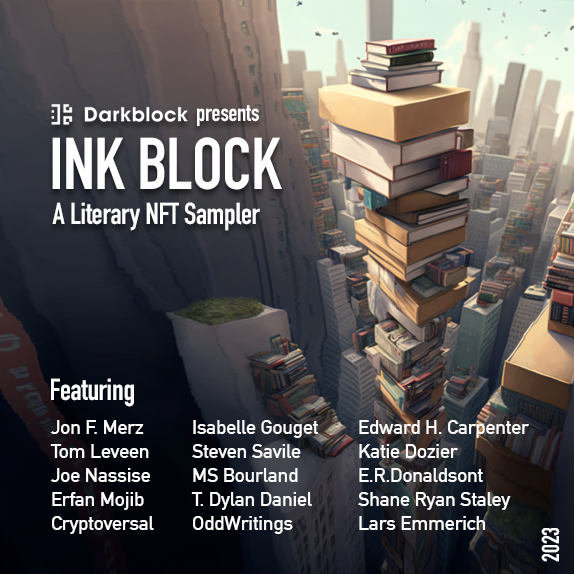 Darkblock is excited to announce its first NFT drop—and it’s free to mint!
Darkblock is excited to announce its first NFT drop—and it’s free to mint!
Ink Block is an experiment in decentralized unlockable content and a celebration of the authors, poets, and storytellers pioneering the next frontier of publishing, powered by Web3 technology and the promise of a decentralized web where you and I control our data and content—not companies.
The idea for Ink Block came about as we at Darkblock did a deep dive into Literary NFTs during February 2023. We wanted to learn everything there was to learn about how writers are using Web3 tools to bypass traditional industry structures, take control of their content, and find new ways to connect with fans and make a living from their work. Attached to the NFT (thanks to Darkblock’s tech) are novel excerpts, short stories, audiobook samples, and poems from more than a dozen writers in the Web3 space who we engaged with over the course of the month. Contributors include NYTimes-bestselling author Joe Nassise, Erfan Mojib, Katie Dozier, Jon F. Merz, Rionna Morgan, Edward H. Carpenter, Cryptoversal, Tom Leveen, and M.S. Bourland.
Creators of all stripes are experimenting with NFTs, but no group is doing more to experiment with the technology than writers. Visual artists and musicians may be more prolific NFT minters, but writers—especially novelists—face an added challenge that’s forced them to be extra creative in how they use NFTs to distribute and monetize their work. That challenge? How to use NFTs to sell their ebooks, but protect those ebooks from being right-click-saved.
Visual artists and musicians don’t worry much about their JPEGs being right-click-saved or their MP3s being free to listen to without buying. As collectibles, the value of those NFTs are in the underlying token, not the infinitely copyable digital file that contains the artistic work. The actual artistic work is a status symbol—and people like showing off their status symbols. They also don’t mind, within reason, when others proliferate the awareness of said status symbols—evident by the trend of artists licensing their work under CC0. Add to this the fact musicians are already conditioned, because of the streaming revolution, to give away their music for free and find other ways to generate income (e.g., sell tickets and merch), and it’s clear their incentives are different from those of writers.
That’s not to say writers don’t like the collectible nature of NFTs—they do, and the authors and poets included in Ink Block have experimented with collectibility, such as creating unique novel covers in varying rarities that people can collect. But as I said, their incentives are different. A novelist wants to protect their IP; they can’t make a living if someone can right-click-save their 300-page novel and upload it to their Kindle. They need to mint the NFT, but not give up the goods until someone buys it. That’s where Darkblock comes in. With our free app, creators can attach encrypted multimedia content to their NFTs in such a way that only the NFT owner can unlock it. The content is stored on Arweave, a decentralized storage network, and is available to be accessed from anywhere that integrates our open-source Viewer, as well as on the minting page, via the Darkblock app, or even on OpenSea if you install our Chrome extension.
We believe true ownership of digital goods isn’t possible without decentralized access, which is what differentiates Darkblock from token gating, the method most writers to date have used to provide exclusive access to their ebooks. There’s nothing inherently wrong with token gating, but it comes dangerously close to recreating the platform-centric Web2 model, exemplified by Kindle, of locking content in walled gardens and gating access to it—but with an NFT instead of a password. Kindle doesn’t sell ebooks, it sells access to ebooks and the illusion of ownership. Some people are okay trading ownership for convenience, but with Web3 technology we can do so much better. And we believe Darkblock, with our infrastructure enabling a future where decentralized content is a reality, is helping us get there.
Feel free to mint the NFT, share the link with your friends, and enjoy the reading material. If you like what you read, we encourage you to support the literary artists represented in Ink Block by following the provided links to where you can mint or buy the original Literary NFTs. Ink Block is on Polygon; while the NFT is free to mint, you will need a wallet with a small amount of MATIC in it to cover gas fees.
Thanks to all our contributors. Mint your free Ink Block here.